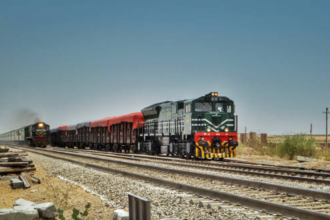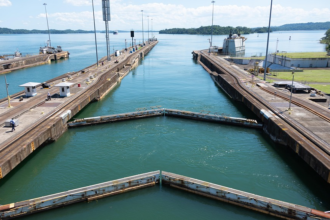In the Cook Islands, nestled in the vast expanse of the Pacific Ocean, a seemingly innocuous rock could alter the course of the nation’s future. A local curator holds up a black, knobbly object for visitors to see. “They look like chocolate truffles, just don’t eat them,” she jokes, referring to the mysterious formation in her hands.
This “rock” is not a mere curiosity but a polymetallic nodule, a geological treasure formed over millennia on the seabed. These nodules, rich in cobalt, nickel, and manganese, have become highly valuable in modern industries, especially for powering the technology that drives our modern world, from electric vehicles to smartphones.
The Cook Islands, a nation comprising 15 volcanic islands in the southern Pacific, is weighing a bold decision. Prime Minister Mark Brown believes deep-sea mining of these precious metals could reshape the nation, offering new financial prospects for its people. However, for some, the economic promise comes with an environmental cost, and questions remain about the true impact of mining this pristine part of the Earth.
How Can the Cook Islands Balance Climate Change and Economic Growth?
The Cook Islands are among the nations most vulnerable to climate change’s effects. Rising sea levels threaten the islands’ very existence, and the ocean, or Moana as it’s known in many Polynesian languages remains a source of livelihood and the greatest danger to their future.
The ocean provides the islanders with fish, tourism, and a source of life. However, beneath the turquoise waters lies an opportunity that some believe could bring unprecedented prosperity: polymetallic nodules. Sitting 6,000 meters deep, these mineral-rich formations could hold the key to the Cook Islands’ economic future.
However, the promise of wealth comes with a significant dilemma. Critics argue that the environmental costs of deep-sea mining remain unclear, and the risks to marine life and ecosystems are unknown. While supporters of the initiative see it as a chance to fund the nation’s development, opponents warn that this pristine part of the planet may be too valuable to disturb.
Why Are Cook Islanders Divided Over Deep-Sea Mining?
A local’s perspective on mining these seabed riches is deeply personal. Her family has long been familiar with these nodules, once seen only as a resource for making knife blades. “We had no idea that cell phones, wind turbines, and electric cars were going to come,” she reflects.
Her support for the mining initiative is strong. As she points out, the Cook Islands have been talking about exploiting these nodules for decades, as evidenced by a newspaper article from 1974. “My point is, we’ve been talking about this for 50-plus years – I think the moratorium time is over,” she says, emphasizing her belief that the time for action has arrived.
Her family connection to the industry is also significant—her husband is a lawyer representing one of the companies with exploration licenses granted by the Cook Islands government. In the library where she works, shelves are filled with books and articles donated by tourists. Tourism is the country’s economic backbone, contributing more than 70% to its GDP.
Can Mining the Seabed Secure the Cook Islands' Economic Future?
The Cook Islands’ Seabeds Minerals Authority estimates that 12 billion wet tonnes of polymetallic nodules are in their waters. These precious resources could change the nation’s dependence on tourism.
Tourism, however, has proven to be a fragile industry. The Covid-19 pandemic crippled global travel, and the economic effects were swift and severe. With rising sea levels and unpredictable weather patterns, climate change has further highlighted the need for diversification. Prime Minister Mark Brown is a key advocate for the deep-sea mining initiative, hoping it will provide the financial stability the islands need.
“The hope is that the income from these metals could lead to more prosperity than the islanders had ever imagined,” he says. “It provides the opportunity for our kids to be able to study at any university in the world without having to incur a student loan. It allows us to have the type of healthcare that our people have to go to New Zealand or Australia for.”
What Are the Environmental Risks of Deep-Sea Mining?
Despite the economic allure, the environmental consequences of deep-sea mining are a significant concern. Advocates argue that harvesting these minerals is less invasive than mining on land and could help the world transition to renewable energy sources. But critics urge caution, saying there is still much we don’t know about the effects on marine life and ecosystems in one of the planet’s last untouched frontiers.
“We’re not talking about a few meters below the sea, we’re talking about 6,000 meters of water that will be disturbed,” says an environmental advocate from the Te Ipukarea Society. The group, based in Rarotonga, calls for more independent research on the potential risks of deep-sea mining. “We are asking for more time for robust independent research, more time for our people to be made better aware of what potential risk might look like,” she says.
The environmental debate is not only limited to outsiders. On the shores of Rarotonga, locals gather to protest. Surfers, kayakers, and swimmers rally around a traditional Polynesian catamaran, chanting, “Te Moana, Te Moana, Paruru ia ra, Paruru ia ra” – “Protect our ocean” in Māori. Their message is clear: more time is needed for research, and the potential impacts on their beloved ocean must not be ignored.
Why Are Some Locals Opposed to Deep-Sea Mining?
Not all Cook Islanders are in favor of deep-sea mining. Some, particularly on the outer islands like Mauke, have expressed concerns about the long-term impact on their way of life. An activist from Mauke speaks out against the mining initiative, noting that the government’s consultations often need more robust participation, especially from those living on smaller, more remote islands.
“People don’t like to rock the boat in the outer islands,” she explains. “So, when we have these consultations, there’s only maybe three of us who would speak up.” June, who is from a small community with only 300 residents, says that despite family connections to the prime minister, her opposition to deep-sea mining is rooted in a desire to protect the future of her people.
She challenges the notion of neutrality: “When locals say, ‘Oh no, I stay neutral on deep-sea mining,’ I say, ‘You can’t drive very far in neutral.’ There are times in your life when you need to actually make a stand for something – we are talking about our future here.”
Is Deep-Sea Mining the Key to the Cook Islands Survival?
The debate over deep-sea mining is a microcosm of the larger global struggle between economic development and environmental protection. For the Cook Islands, it represents a delicate balancing act. Prime Minister Mark Brown is relentless in his belief that the benefits of deep-sea mining outweigh the risks, arguing that the country has little choice but to act. “If we don’t want mining and we don’t want to get all these metals, we need to stop doing just about everything we’re doing,” says a representative from Moana Minerals, a company with an exploration license.
Yet, as many point out, the stakes are high. “We’re talking about the future of our children and our land,” says a local activist. For now, the Cook Islands are caught between the promise of prosperity and preserving their pristine environment—only time will tell which path they will choose.








